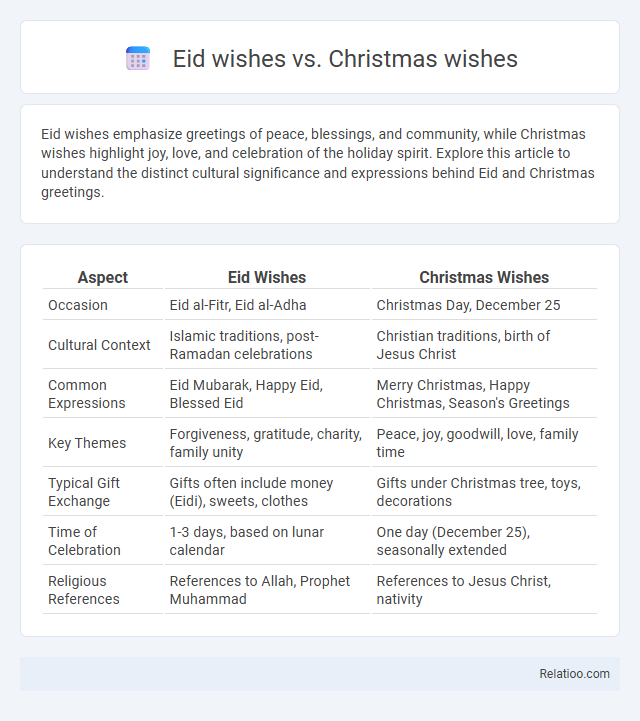Eid wishes emphasize greetings of peace, blessings, and community, while Christmas wishes highlight joy, love, and celebration of the holiday spirit. Explore this article to understand the distinct cultural significance and expressions behind Eid and Christmas greetings.
Table of Comparison
| Aspect | Eid Wishes | Christmas Wishes |
|---|---|---|
| Occasion | Eid al-Fitr, Eid al-Adha | Christmas Day, December 25 |
| Cultural Context | Islamic traditions, post-Ramadan celebrations | Christian traditions, birth of Jesus Christ |
| Common Expressions | Eid Mubarak, Happy Eid, Blessed Eid | Merry Christmas, Happy Christmas, Season's Greetings |
| Key Themes | Forgiveness, gratitude, charity, family unity | Peace, joy, goodwill, love, family time |
| Typical Gift Exchange | Gifts often include money (Eidi), sweets, clothes | Gifts under Christmas tree, toys, decorations |
| Time of Celebration | 1-3 days, based on lunar calendar | One day (December 25), seasonally extended |
| Religious References | References to Allah, Prophet Muhammad | References to Jesus Christ, nativity |
Introduction to Eid and Christmas Wishes
Eid wishes celebrate the conclusion of Ramadan or Eid al-Adha with messages emphasizing gratitude, community, and spiritual renewal. Christmas wishes focus on joy, peace, and the celebration of the birth of Jesus Christ, often highlighting themes of family and generosity. Both types of wishes reflect cultural and religious significance, fostering connection and goodwill among friends and family during their respective festive seasons.
Cultural Significance of Eid and Christmas Greetings
Eid wishes and Christmas wishes reflect deep cultural significance tied to Islamic and Christian traditions, respectively, symbolizing themes of gratitude, compassion, and family unity. Eid greetings often emphasize communal harmony and spiritual renewal following Ramadan or the Hajj pilgrimage, while Christmas wishes celebrate the birth of Jesus Christ and convey messages of joy, hope, and peace. Your choice of greeting conveys respect for these rich cultural heritages and fosters mutual understanding across diverse communities.
Common Phrases in Eid Wishes
Eid wishes commonly include phrases such as "Eid Mubarak," "Blessings of Eid," and "May Allah's blessings be with you," emphasizing spiritual gratitude and community joy. Unlike Christmas wishes, which often center around phrases like "Merry Christmas" and "Season's Greetings" stressing festive cheer and goodwill, Eid greetings focus more on faith and prayerful hopes. Your use of these common Eid phrases can enhance cultural understanding and convey heartfelt respect during the celebration.
Popular Expressions in Christmas Wishes
Christmas wishes often emphasize warmth, joy, and togetherness with popular expressions like "Merry Christmas," "Season's Greetings," and "Happy Holidays." Eid wishes typically convey blessings, gratitude, and spiritual reflection, using phrases such as "Eid Mubarak" and "Blessed Eid." The generic term "wish" covers a broad range of intentions but lacks the cultural specificity and rich emotional context found in holiday greetings like Christmas and Eid wishes.
Similarities Between Eid and Christmas Greetings
Eid wishes and Christmas wishes both convey heartfelt messages of joy, peace, and blessings, reflecting the deep cultural significance of these celebrations. Your expressions during Eid and Christmas often include prayers for prosperity, happiness, and togetherness, emphasizing shared values like family and gratitude. Both greetings serve as meaningful ways to strengthen bonds and spread goodwill across diverse communities worldwide.
Differences in Wishing Traditions
Eid Wishes center around blessings, gratitude, and prayers specific to Islamic tradition, often reflecting themes of sacrifice and renewal after fasting during Ramadan or Hajj. Christmas Wishes emphasize joy, goodwill, and the celebration of the birth of Jesus Christ, incorporating themes of family gatherings, gift-giving, and peace. Your choice of wish depends on the cultural and religious context, highlighting distinct values and rituals inherent in each holiday's celebration.
Impact of Religion on Holiday Messages
Eid wishes deeply reflect Islamic values, emphasizing prayers, gratitude, and community unity, while Christmas wishes often incorporate Christian themes of joy, hope, and the birth of Jesus. Holiday messages are shaped by religious beliefs, which influence the tone, content, and symbolism used to convey blessings and goodwill. Understanding the impact of religion on your holiday wishes can enhance their authenticity and cultural sensitivity.
Modern Trends in Holiday Wishes
Eid wishes increasingly emphasize personalized messages reflecting cultural values and digital innovation, using multimedia platforms for authentic connections. Christmas wishes integrate inclusive language and eco-friendly themes, aligning with sustainability trends and global diversity awareness. Modern holiday wishes overall leverage social media, emojis, and interactive formats to enhance emotional engagement and accessibility across diverse audiences.
Role of Social Media in Sharing Festive Greetings
Social media platforms have transformed the way Eid wishes, Christmas wishes, and general festive greetings are shared, enabling instant, global communication that bridges cultural and geographic divides. Eid wishes often emphasize themes of gratitude and community, while Christmas wishes highlight joy and generosity, with social media amplifying these unique cultural expressions through personalized messages, multimedia content, and interactive engagement. The role of social media in distributing festive wishes enhances the emotional impact and inclusivity of celebrations, fostering a sense of unity and shared joy among diverse audiences worldwide.
Conclusion: Embracing Diversity Through Holiday Wishes
Holiday wishes like Eid, Christmas, and general wishes celebrate diverse traditions and cultures, enriching your social connections and fostering mutual respect. Each type of greeting carries unique meanings that reflect varied customs, emphasizing the importance of inclusivity in shared celebrations. Embracing this diversity through thoughtful holiday wishes highlights your appreciation for different cultural backgrounds and strengthens bonds across communities.

Infographic: Eid Wishes vs Christmas Wishes
 relatioo.com
relatioo.com